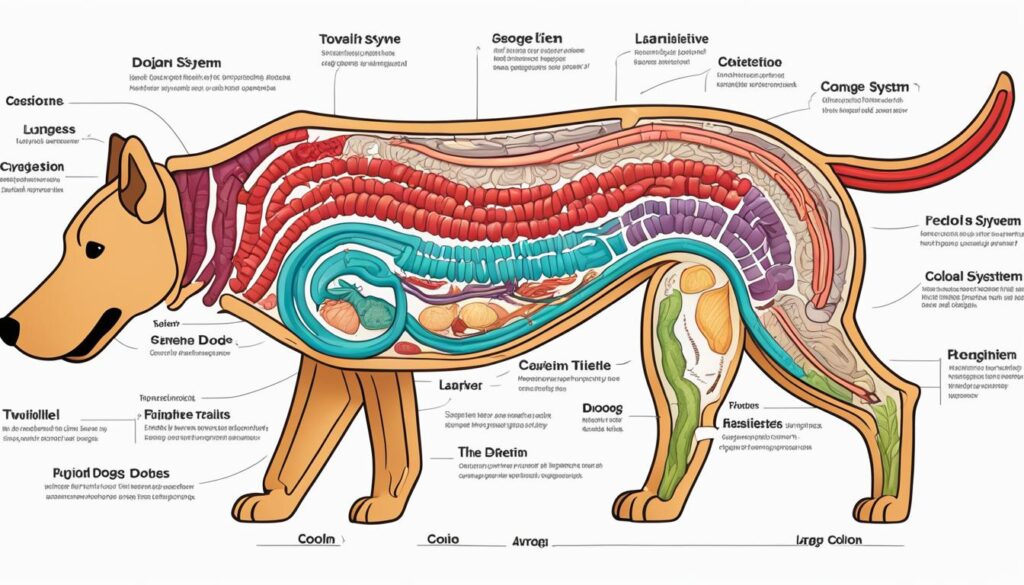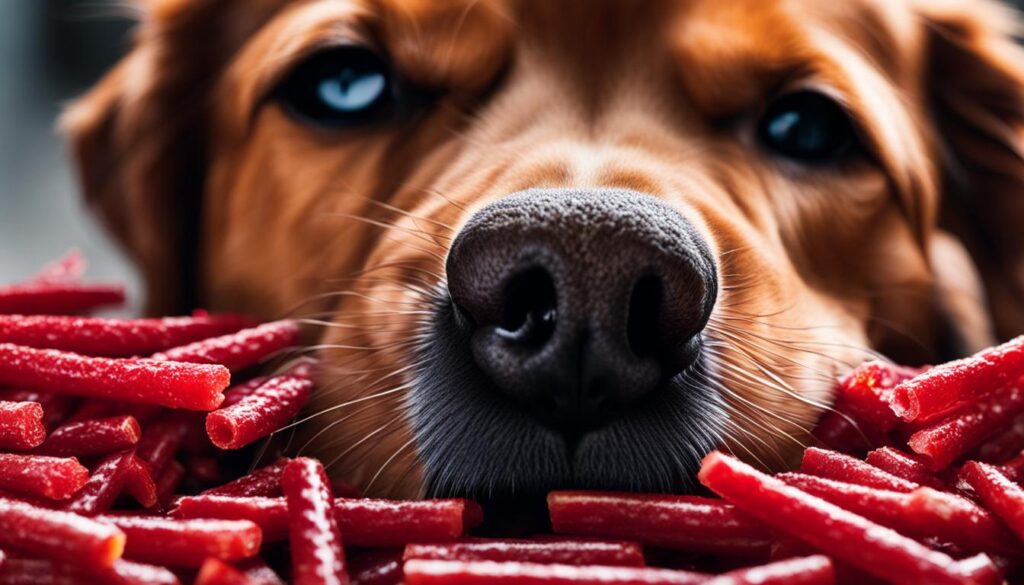Can Dogs Eat Twizzlers? Exploring the Safety of Twizzlers for Dogs
Twizzlers are a popular candy enjoyed by many people, but can dogs safely consume them? As a responsible pet owner, it’s important to understand the potential risks associated with feeding Twizzlers to your furry friend.
Dogs have unique dietary needs and digestive systems that differ from humans. The ingredients and composition of Twizzlers may not be suitable for their health and well-being. In this article, we will delve into the safety concerns surrounding dogs eating Twizzlers and explore healthier alternatives for your canine companion.
Key Takeaways:
- Twizzlers are not safe for dogs to consume due to the high sugar content and potential health risks.
- Dogs have different digestive systems and dietary needs than humans, making certain foods unsuitable for them.
- Feeding Twizzlers to your dog can lead to weight gain, obesity, and potential allergic reactions.
- Choose healthier treat alternatives such as fruits, vegetables, and commercially available or homemade dog treats.
- Consult with your veterinarian if you have any concerns about your dog’s diet or if they have consumed Twizzlers.
Understanding a Dog’s Digestive System
Dogs have a unique digestive system that differs from humans. It’s important to understand how their digestive process works before determining if Twizzlers are suitable for them.
The digestive system of a dog starts in the mouth, where food is chewed and mixed with saliva. From there, it moves into the stomach, where it undergoes further breakdown through the action of stomach acid and digestive enzymes.
After that, it moves into the small intestine, where nutrients are absorbed into the bloodstream. Finally, the remaining waste travels through the large intestine and is excreted as feces.
Dogs have specific dietary needs and may not tolerate certain foods as well as humans do. It is essential to consider their digestive process and nutritional requirements when choosing what to feed them.

“The dog has seldom been successful in pulling man up to its level of sagacity, but man has frequently dragged the dog down to his.” – James Thurber
What are Twizzlers Made of?
Twizzlers are a popular candy known for their unique taste and chewy texture. But have you ever wondered what ingredients go into making these delightful treats? Let’s take a closer look.

Twizzlers are primarily made of a combination of ingredients that contribute to their flavor and appearance. Here are the key components:
- Corn syrup: This ingredient provides sweetness and helps bind the other ingredients together.
- Enriched wheat flour: It gives Twizzlers their chewy texture.
- Sugar: Added for extra sweetness.
- Cornstarch: Acts as a thickening agent, ensuring the right consistency.
- Palm oil: Gives Twizzlers moisture and helps maintain their texture.
- Salt: Enhances the overall flavor.
- Artificial flavorings: These ingredients mimic various fruit flavors, adding a burst of taste.
- Artificial colors: Used to enhance the appearance of Twizzlers.
These ingredients work together to create the distinctive taste and texture that Twizzlers are known for. Whether you enjoy the classic strawberry or other fruit-flavored varieties, these ingredients play a crucial role in making each Twizzler a delightful treat.
Potential Health Risks of Dogs Eating Twizzlers
While Twizzlers may be a delightful treat for humans, they can pose potential health risks for dogs. It’s important to be aware of these risks and take steps to keep your canine companion safe. Here are some of the key health risks associated with dogs consuming Twizzlers:
Sugar Content and Obesity
Twizzlers are high in sugar, which can contribute to weight gain and obesity in dogs. Just like humans, excessive sugar intake can lead to various health problems in dogs, including diabetes, joint issues, and heart disease. It’s essential to monitor your dog’s sugar intake and limit their consumption of sugary treats like Twizzlers.
Artificial Sweeteners and Xylitol Toxicity
While Twizzlers themselves do not contain the artificial sweetener xylitol, it’s important to be cautious of other sugar-free candies and gum that may contain this ingredient. Xylitol is highly toxic to dogs and can cause a rapid release of insulin, leading to hypoglycemia (low blood sugar), liver damage, and potentially even death. Always check the ingredients of any candy or gum before giving it to your dog.
Artificial Colors and Allergies
Twizzlers contain artificial colors, which some dogs may be sensitive or allergic to. These artificial colorings have been linked to various adverse reactions in dogs, including skin irritations, gastrointestinal upset, or respiratory issues. If you notice any signs of allergies or sensitivity in your dog after consuming Twizzlers, such as itching, rashes, vomiting, or difficulty breathing, it’s important to seek veterinary attention.
To ensure the well-being of your furry friend, it’s best to avoid feeding them Twizzlers altogether. Instead, opt for healthier treat alternatives that are safe and beneficial for your dog’s overall health. Remember, always consult with your veterinarian regarding your dog’s dietary needs and any concerns you may have.

What to Do if Your Dog Eats Twizzlers
If you discover that your dog has consumed Twizzlers, it’s important to take immediate action to ensure their well-being. Here are some steps you can follow:
- Monitor for symptoms: Keep a close eye on your dog for any signs of distress or discomfort after eating Twizzlers. Look out for symptoms such as vomiting, diarrhea, excessive drooling, changes in behavior, appetite, or energy levels.
- Assess the severity: If your dog displays severe symptoms like difficulty breathing, seizures, or loss of consciousness, it is crucial to seek immediate veterinary assistance. These signs may indicate a more serious reaction or medical emergency.
- Contact your veterinarian: Reach out to your veterinarian and provide them with relevant information. Include details such as the quantity of Twizzlers consumed, the size and breed of your dog, and any observed symptoms. This information will help your veterinarian assess the situation and provide appropriate guidance.
- Follow professional advice: Your veterinarian will offer professional guidance tailored to your dog’s specific needs. They may recommend further monitoring at home, advice for managing any mild symptoms, or suggest bringing your dog in for immediate examination and treatment.
Remember, every dog is different, and reactions can vary. If you are unsure or have any concerns about your dog’s well-being, it’s always best to err on the side of caution and consult with a veterinarian.
Healthy Treat Alternatives for Dogs
Instead of offering Twizzlers to your dog, there are healthier treat alternatives that you can provide to satisfy their cravings. Fruits and vegetables such as carrots, apples, blueberries, watermelon, and green beans can be safe and nutritious options for dogs. These natural snacks are packed with vitamins, minerals, and fiber, promoting good digestion and overall well-being.
If you’re looking for convenient options, there are also commercially available dog treats specifically made with high-quality ingredients and tailored to your dog’s age, size, and dietary needs. These treats often come in a variety of flavors and textures, providing both taste and entertainment for your furry friend.
For pet owners who prefer a more hands-on approach, making homemade dog treats can be a fun and rewarding activity. There are numerous recipes available online that cater to your dog’s specific dietary requirements, allowing you to control the ingredients and ensure the treats are free from harmful additives. From peanut butter and pumpkin biscuits to frozen yogurt popsicles, the possibilities are endless when making homemade treats for your beloved pet.
By opting for these healthy treat alternatives, you can provide your dog with a safe and enjoyable snacking experience while still taking care of their nutritional needs. Remember to always introduce new foods gradually and consult with your veterinarian if you have any concerns about your dog’s diet or specific dietary restrictions.
Note: Contact your veterinarian before making any significant changes to your dog’s diet and to ensure the safety of any new treats introduced.
Table: Comparison of Healthy Treat Alternatives
| Treat Option | Nutritional Benefits | Key Features |
|---|---|---|
| Fruits and Vegetables | Rich in vitamins, minerals, and fiber | Natural, low in calories, promotes good digestion |
| Commercially Available Dog Treats | Specifically tailored to meet dog’s nutritional needs | Convenient, variety of flavors and textures |
| Homemade Dog Treats | Customizable, free from harmful additives | Allows control of ingredients, fun activity for pet owners |
Conclusion
In conclusion, it is important to understand that Twizzlers are not suitable for dogs. The high sugar content, potential for obesity, and artificial colors make them a risky treat for our canine friends. Feeding Twizzlers to your dog can lead to various health issues and discomfort.
It is essential to prioritize your dog’s health and well-being by offering them healthier treat alternatives. Fruits, vegetables, and commercially available or homemade dog treats are much safer options. These alternatives provide essential nutrients and minimize the potential risks associated with inappropriate food choices.
Always consult with your veterinarian if you have any concerns about your dog’s diet or if they have already consumed Twizzlers. Your veterinarian can provide personalized guidance and advice based on your dog’s specific needs. By making informed decisions and providing your dog with appropriate treats, you can ensure their continued happiness and overall health.
FAQ
Can dogs eat Twizzlers?
No, Twizzlers are not suitable for dogs due to their high sugar content and potential health risks.
What are the potential health risks of dogs eating Twizzlers?
Dogs consuming Twizzlers can be at risk of weight gain, obesity, and potential complications such as diabetes, joint issues, and heart disease. Twizzlers also contain artificial colors that may cause allergies or sensitivities in some dogs.
What should I do if my dog eats Twizzlers?
Monitor your dog for any immediate signs of distress, such as vomiting, diarrhea, or changes in behavior, appetite, or energy levels. If your dog displays severe symptoms such as difficulty breathing, seizures, or loss of consciousness, seek immediate veterinary assistance. Contact your veterinarian and provide relevant information about the quantity of Twizzlers consumed, your dog’s size, and any observed symptoms for professional guidance tailored to your dog’s needs.
What are some healthy treat alternatives for dogs?
Instead of offering Twizzlers, you can provide your dog with healthier alternatives such as fruits and vegetables like carrots, apples, blueberries, watermelon, and green beans. Additionally, commercially available dog treats made with high-quality ingredients, tailored to your dog’s age, size, and dietary needs, or homemade dog treats can be safe and enjoyable snacking options.


